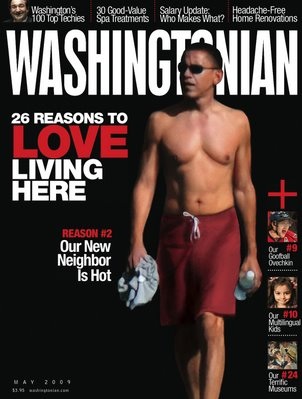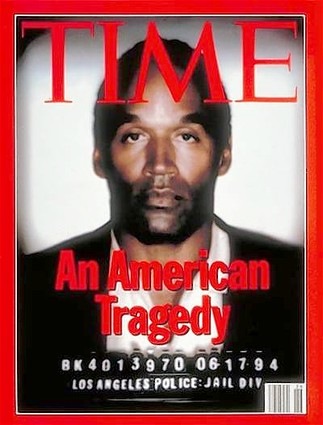The web is buzzing about The Washingtonian magazine's choice to put a paparazzi photo of a buff and shirtless President Obama on the cover of its May issue.

The frenzy of comments about The Washingtonian's decision are running across the gamut, from a reprise of the drooling appreciation for Obama's taut abs first seen when the paparazzi photos of Obama on the beach hit in December: "Really hot Obama," "President Beefcake;" to stinging political rebukes for what some take to be the magazine's pandering to its audience and/or to the administration: "embarrassing."
But I'd like to call your attention to what Washingtonian did with the original Bauer-Griffin photo. Said Leslie Milk, the magazine's lifestyle editor, "I know we changed the color of his suit to red, and dropped out the background." In the original photo the president is wearing a black suit and walking from what appears to be sliding glass doors leading to a living room. What also appears to be altered from the original image is the contrast and the color balance of the president's skin. On The Washingtonian's cover the sun striking Obama's chest makes him appear more golden, almost glistening.

In the world of news, that's unethical. The rule of thumb is, if you want to change what's in the photo, choose another photo. Making Obama into a man wearing brilliant red surfer trunks, instead of a more modest black pair, making the image more dramatic by having him walking out of darkness, and changing the exposure so he looks more gilded changes viewers' ideas about who the man is.
Way back in 1994, Time magazine famously doctored the mug shot photo of OJ Simpson to make his face darker, more shadowed. The magazine was pilloried for "demonizing" Simpson as a blacker man. "Illustrator Matt Mahurin was the one to alter the image, saying later that he 'wanted to make it more artful, more compelling.'"

Eleven years later, in 2005, Newsweek magazine tinkered with its cover of Martha Stewart to illustrate her coming release from prison, running a composite image of Stewart's head on the photo of a body of model. The National Press Photographers Association, the society of professional photojournalism, called that cover "a major ethical breach."

Where in the spectrum of ethics does the decision by The Washingtonian come? A key issue is whether we "know about it." said Carl Sessions Stepp, professor of journalism at the University of Maryland. "When a magazine puts a person on its cover, our expectation is that the person we are seeing is the person who was seen through the lens of the photographer." But if we're told or it's obvious that an image has been "fictionalized" then we approach it with different expectations. We don't assume what's depicted is an accurate representation--both visually and psychologically--of who we're looking at.
What's the danger of an audience thinking that the president looks model-hot? It's a simplification of who he is--it's the photographic version of presenting Obama as the shining hope for the country. It's ascribing to him more power--even if the power is sexual--than he actually has.
What's the possible consequence? When individual players are made to seem larger or are given greater clout than they actually have, that prompts us to expect outcomes that cannot be delivered--and also encourages us to believe that we don't have to help solve the nation's problems, because we certainly do not measure up to the perfection we have been shown.